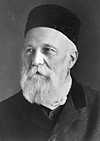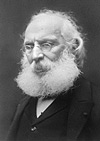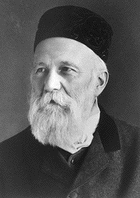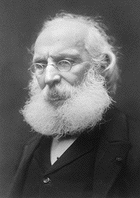|
|
|
 |
The Nobel Peace Prize 1901
|
|
|
|
 |
 |
|
Jean Henri Dunant
|
Frédéric Passy
|
 1/2 of the prize 1/2 of the prize
|
 1/2 of the prize 1/2 of the prize
|
|
Switzerland |
France |
| |
|
|
Founder of the
International Committee of the Red Cross, Geneva; Originator Geneva
Convention (Convention de Genève) |
Founder and President of
first French peace society (since 1889 called Société française pour
l'arbitrage entre nations) |
b. 1828
d. 1910 |
b. 1822
d. 1912 |
The Nobel Peace Prize 1901
The Occasion of the First Award
The first Nobel Peace Prize was awarded at a meeting of
the Norwegian Parliament which took place at ten o'clock on the morning of
December 10, 1901. The ceremony was brief, lasting only fifteen minutes. Mr.
Carl Christian Bemer, president of the Parliament, opened it with this brief
address*:
"The Norwegian people have always demanded that their
independence be respected. They have always been ready to defend it. But, at
the same time, they have always had a keen desire and need for peace. Our
nation has wished to pursue its material and intellectual development in
peace and on good terms with other nations. This basic concept has been put
into practice repeatedly and with increasing strength by the Norwegian
Parliament. At various times the Parliament has gone on record in favor of
the signing of peace and arbitration treaties with foreign powers in order
to prevent settlement of possible disputes by armed force and to insure just
solutions through peaceful means. We may well believe that this need which
motivates the Norwegian people, this ardent desire for peace and good
relations between nations, is what influenced Dr. Alfred Nobel to entrust to
the Parliament of Norway the important responsibility of awarding the prize,
through a committee of five, to the one whose work for peace and for
fraternity among nations most deserves it. Today when this Peace Prize is to
be awarded for the first time, our thoughts turn back in respectful
recognition to the man of noble sentiments who, perceiving things to come,
knew how to give priority to the great problems of civilization, putting in
first place among them work for peace and fraternity among nations. We hope
that what he has done in the interest of this great cause will achieve
results which will live up to his noble intentions."
Upon completing his remarks, Mr. Bemer gave the floor
to Mr. Jorgen Gunnarsson Løvland, a member of the Nobel Committee and at
this time minister of Public Works. Mr. Løvland, in place of Mr. Getz, the
Committee chairman, who had died the previous month, announced that the
prize was awarded half to Henri Dunant and half to Frederic Passy. There was
no presentation speech, and after some further official formalities, the
Parliament adjourned.
Les Prix Nobel does not record that either of the laureates was
present; and neither delivered a Nobel lecture later, each, at his own
request, having been released from this obligation by the Nobel Committee.
* The translation is based on the Norwegian text in
Les Prix Nobel en 1901, which also contains a French translation.
From Nobel Lectures, Peace 1901-1925, Editor
Frederick W. Haberman, Elsevier Publishing Company, Amsterdam, 1972
Henri Dunant – Biography
 Jean
Henri Dunant's life (May 8, 1828-October 30, 1910) is a study in
contrasts. He was born into a wealthy home but died in a hospice; in middle
age he juxtaposed great fame with total obscurity, and success in business
with bankruptcy; in old age he was virtually exiled from the Genevan society
of which he had once been an ornament and died in a lonely room, leaving a
bitter testament. His passionate humanitarianism was the one constant in his
life, and the
Red Cross his living monument. Jean
Henri Dunant's life (May 8, 1828-October 30, 1910) is a study in
contrasts. He was born into a wealthy home but died in a hospice; in middle
age he juxtaposed great fame with total obscurity, and success in business
with bankruptcy; in old age he was virtually exiled from the Genevan society
of which he had once been an ornament and died in a lonely room, leaving a
bitter testament. His passionate humanitarianism was the one constant in his
life, and the
Red Cross his living monument.
The Geneva household into which Henri Dunant was born was religious,
humanitarian, and civic-minded. In the first part of his life Dunant engaged
quite seriously in religious activities and for a while in full-time work as
a representative of the Young
Men's Christian Association, traveling in France, Belgium, and Holland.
When he was twenty-six, Dunant entered the business world as a
representative of the Compagnie genevoise des Colonies de Sétif in North
Africa and Sicily. In 1858 he published his first book, Notice sur la
Régence de Tunis [An Account of the Regency in Tunis], made up for the
most part of travel observations but containing a remarkable chapter, a long
one, which he published separately in 1863, entitled L'Esclavage chez les
musulmans et aux États-Unis d'Amérique [Slavery among the Mohammedans
and in the United States of America].
Having served his commercial apprenticeship, Dunant devised a daring
financial scheme, making himself president of the Financial and Industrial
Company of Mons-Gémila Mills in Algeria (eventually capitalized at
100,000,000 francs) to exploit a large tract of land. Needing water rights,
he resolved to take his plea directly to Emperor Napoleon III. Undeterred by
the fact that Napoleon was in the field directing the French armies who,
with the Italians, were striving to drive the Austrians out of Italy, Dunant
made his way to Napoleon's headquarters near the northern Italian town of
Solferino. He arrived there in time to witness, and to participate in the
aftermath of, one of the bloodiest battles of the nineteenth century. His
awareness and conscience honed, he published in 1862 a small book Un
Souvenir de Solférino [A Memory of Solferino], destined to make
him famous.
A Memory has three themes. The first is that of the battle itself.
The second depicts the battlefield after the fighting - its «chaotic
disorder, despair unspeakable, and misery of every kind» - and tells the
main story of the effort to care for the wounded in the small town of
Castiglione. The third theme is a plan. The nations of the world should form
relief societies to provide care for the wartime wounded; each society
should be sponsored by a governing board composed of the nation's leading
figures, should appeal to everyone to volunteer, should train these
volunteers to aid the wounded on the battlefield and to care for them later
until they recovered. On February 7, 1863, the Société genevoise d'utilité
publique [Geneva Society for Public Welfare] appointed a committee of five,
including Dunant, to examine the possibility of putting this plan into
action. With its call for an international conference, this committee, in
effect, founded the Red Cross. Dunant, pouring his money and time into the
cause, traveled over most of Europe obtaining promises from governments to
send representatives. The conference, held from October 26 to 29, with
thirty-nine delegates from sixteen nations attending, approved some sweeping
resolutions and laid the groundwork for a gathering of plenipotentiaries. On
August 22, 1864, twelve nations signed an international treaty, commonly
known as the Geneva Convention, agreeing to guarantee neutrality to sanitary
personnel, to expedite supplies for their use, and to adopt a special
identifying emblem - in virtually all instances a red cross on a field of
white1.
Dunant had transformed a personal idea into an international treaty. But his
work was not finished. He approved the efforts to extend the scope of the
Red Cross to cover naval personnel in wartime, and in peacetime to alleviate
the hardships caused by natural catastrophes. In 1866 he wrote a brochure
called the Universal and International Society for the Revival of the
Orient, setting forth a plan to create a neutral colony in Palestine. In
1867 he produced a plan for a publishing venture called an «International
and Universal Library» to be composed of the great masterpieces of all time.
In 1872 he convened a conference to establish the «Alliance universelle de
l'ordre et de la civilisation» which was to consider the need for an
international convention on the handling of prisoners of war and for the
settling of international disputes by courts of arbitration rather than by
war.
The eight years from 1867 to 1875 proved to be a sharp contrast to those of
1859-1867. In 1867 Dunant was bankrupt. The water rights had not been
granted, the company had been mismanaged in North Africa, and Dunant himself
had been concentrating his attention on humanitarian pursuits, not on
business ventures. After the disaster, which involved many of his Geneva
friends, Dunant was no longer welcome in Genevan society. Within a few years
he was literally living at the level of the beggar. There were times, he
says2, when he dined on a crust of bread,
blackened his coat with ink, whitened his collar with chalk, slept out of
doors.
For the next twenty years, from 1875 to 1895, Dunant disappeared into
solitude. After brief stays in various places, he settled down in Heiden, a
small Swiss village. Here a village teacher named Wilhelm Sonderegger found
him in 1890 and informed the world that Dunant was alive, but the world took
little note. Because he was ill, Dunant was moved in 1892 to the hospice at
Heiden. And here, in Room 12, he spent the remaining eighteen years of his
life. Not, however, as an unknown. After 1895 when he was once more
rediscovered, the world heaped prizes and awards upon him.
Despite the prizes and the honors, Dunant did not move from Room 12. Upon
his death, there was no funeral ceremony, no mourners, no cortege. In
accordance with his wishes he was carried to his grave «like a dog»3.
Dunant had not spent any of the prize monies he had received. He bequeathed
some legacies to those who had cared for him in the village hospital,
endowed a «free bed» that was to be available to the sick among the poorest
people in the village, and left the remainder to philanthropic enterprises
in Norway and Switzerland.
| Selected Bibliography |
| Les Débuts de la Croix-Rouge en France.
Paris, Librairie Fischbacher, 1918. |
| Dunant, J. Henri. His manuscripts are held by the
Bibliothèque publique et universitaire de Genève. |
| Dunant, J. Henry, A Memory of Solferino.
London, Cassell, 1947. A translation from the French of the first
edition of Un Souvenir de Solférino, published in 1862. The
author published the original as «J. Henry Dunant», although he is
usually referred to as «Henri Dunant». |
| Gagnebin, Bernard, «Le Rôle d'Henry Dunant
pendant la guerre de 1870 et le siège de Paris», bound separately but
originally published in Revue internationale de la Croix-Rouge
(avril, 1953). |
| Gigon, Fernand, The Epic of the Red Cross or
the Knight Errant of Charity, translated from the French by Gerald
Griffin. London, Jarrolds, 1946. |
| Gumpert, Martin, Dunant: The Story of the Red
Cross. New York, Oxford University Press, 1938. |
| Hart, Ellen, Man Born to Live: Life and Work
of Henry Dunant, Founder of the Red Cross. London, Gollancz, 1953. |
| Hendtlass, Willy, «Henry Dunant: Leben und Werk»,
in Solferino, pp. 37-84. Essen Cityban, Schiller, 1959. |
| Hommage à Henry Dunant. Genève, 1963. |
| Huber, Max, «Henry Dunant», in Revue
internationale de la Croix-Rouge, 484 (avril, 1959) 167-173. A
translation of a brief sketch originally published in German in 1928. |
| |
1. The emblem in Muslim countries is the red crescent
and in Iran is the red lion and sun. (For a brief history of the Red Cross
see
history of the Red Cross.)
2. «Extraits des mémoires» in Les Débuts de la Croix-Rouge en France,
p. 72.
3. Taken from a letter written by Dunant and published by René Sonderegger;
quoted by Gigon in The Epic of the Red Cross, p. 147.
From Nobel Lectures, Peace 1901-1925, Editor
Frederick W. Haberman, Elsevier Publishing Company, Amsterdam, 1972
This autobiography/biography was
written at the time of the award and later published in the book series
Les Prix Nobel/Nobel
Lectures. The information is sometimes updated with an addendum
submitted by the Laureate. To cite this document, always state the source as
shown above.
Frédéric Passy – Biography
 Frédéric Passy (May 20, 1822-June 12, 1912) was born in Paris and
lived there his entire life of ninety years. The tradition of the French
civil service was strong in Passy's family, his uncle, Hippolyte Passy
(1793-1880), rising to become a cabinet minister under both Louis Philippe
and Louis Napoleon. Educated as a lawyer, Frédéric Passy entered the civil
service at the age of twenty-two as an accountant in the State Council, but
left after three years to devote himself to systematic study of economics.
He emerged as a theoretical economist in 1857 with his Mélanges
économiques, a collection of essays he had published in the course of
his research, and he secured his scholarly reputation with a series of
lectures delivered in 1860-1861 at the University of Montpellier and later
published in two volumes under the title Leçons d'économie politique.
An admirer of Richard Cobden, he became an ardent free trader, believing
that free trade would draw nations together as partners in a common
enterprise, result in disarmament, and lead to the abandonment of war. Passy
lectured on economic subjects in virtually every city and university of any
consequence in France and continued a stream of publications on economic
subjects, some of the more important being Les Machines et leur influence
sur le développement de l'humanité (1866), Malthus et sa doctrine
(1868), L'Histoire du travail (1873). Passy's passionate belief in
education found expression in De la propriété intellectuelle (1859)
end La Démocratie et l'instruction (1864). For these contributions,
among others, he was elected in 1877 to membership in the Académie de
sciences morales et politiques, a unit of the Institut de France.
Frédéric Passy (May 20, 1822-June 12, 1912) was born in Paris and
lived there his entire life of ninety years. The tradition of the French
civil service was strong in Passy's family, his uncle, Hippolyte Passy
(1793-1880), rising to become a cabinet minister under both Louis Philippe
and Louis Napoleon. Educated as a lawyer, Frédéric Passy entered the civil
service at the age of twenty-two as an accountant in the State Council, but
left after three years to devote himself to systematic study of economics.
He emerged as a theoretical economist in 1857 with his Mélanges
économiques, a collection of essays he had published in the course of
his research, and he secured his scholarly reputation with a series of
lectures delivered in 1860-1861 at the University of Montpellier and later
published in two volumes under the title Leçons d'économie politique.
An admirer of Richard Cobden, he became an ardent free trader, believing
that free trade would draw nations together as partners in a common
enterprise, result in disarmament, and lead to the abandonment of war. Passy
lectured on economic subjects in virtually every city and university of any
consequence in France and continued a stream of publications on economic
subjects, some of the more important being Les Machines et leur influence
sur le développement de l'humanité (1866), Malthus et sa doctrine
(1868), L'Histoire du travail (1873). Passy's passionate belief in
education found expression in De la propriété intellectuelle (1859)
end La Démocratie et l'instruction (1864). For these contributions,
among others, he was elected in 1877 to membership in the Académie de
sciences morales et politiques, a unit of the Institut de France.
Passy was not, however, a cloistered scholar; he was a man of action. In
1867, encouraged by his leadership of public opinion in trying to avert
possible war between France and Prussia over the Luxembourg question, he
founded the «Ligue internationale et permanente de la paix». When the Ligue
became a casualty of the Franco-Prussian War of 1870-1871, he reorganized it
under the title «Société française des amis de la paix» which in turn gave
way to the more specifically oriented «Société française pour l'arbitrage
entre nations», established in 1889.
Passy carried on his efforts within the government as well. He was elected
to the Chamber of Deputies in 1881, again in 1885, and defeated in 1889. In
the Chamber he supported legislation favorable to labor, especially an act
relating to industrial accidents, opposed the colonial policy of the
government, drafted a proposal for disarmament, and presented a resolution
calling for arbitration of international disputes.
His parliamentary interest in arbitration was whetted by
Randal Cremer's
success in guiding through the British Parliament a resolution stipulating
that England and the United States should refer to arbitration any disputes
between them not settled by the normal methods of diplomacy. In 1888 Cremer
headed a delegation of nine British members of Parliament who met in Paris
with a delegation of twenty-four French deputies, headed by Passy, to
discuss arbitration and to lay the groundwork for an organization to advance
its acceptance. The next year, fifty-six French parliamentarians,
twenty-eight British, and scattered representatives from the parliaments of
Italy, Spain, Denmark, Hungary, Belgium, and the United States formed the
Interparliamentary Union,
with Passy as one of its three presidents. The Union, still in existence,
established a headquarters to serve as a clearinghouse of ideas, and
encouraged the formation of informal individual national parliamentary
groups willing to support legislation leading to peace, especially through
arbitration.
Passy's thought and action had unity. International peace was the goal,
arbitration of disputes in international politics and free trade in goods
the means, the national units making up the Interparliamentary Union the
initiating agents, the people the sovereign constituency.
Through his prodigious labors over a period of half a century in the peace
movement, Passy became known as the «apostle of peace». He wrote unceasingly
and vividly. His Pour la paix (1909), which came out when he was
eighty-seven years old, is a personalized account - in lieu of an
autobiography which he deplored - of his work for international peace,
noting especially the founding of the Ligue, the «période décisive» when the
Interparliamentary Union was established, the development of peace
congresses, and the value of the Hague Conferences.
Passy was a renowned speaker, noted for the intellectual demands he made on
his audiences, as well as for his powerful voice, his ample gestures, and
his majestic and dignified manner.
| Selected Bibliography |
| «Frédéric Passy», American Journal of
International Law, 6 (October, 1912) 975-976. |
| Gide, Charles, «Obituary: Frédéric Passy
(1822-1912)», The Economic Journal, 22 (September, 1912) 506-507. |
| Institut international de bibliographie,
Répertoire bibliographique universel: Bibliographie des écrits de
Frédéric Passy. Bruxelles, 1900. |
| Le Foyer, Lucien, «Un Grand Pacifiste», Le
Monde illustré (29 juin 1912) 418. |
| Maza, Herbert, «Frédéric Passy: La Fondation de
l'Union Interparlementaire», in Neuf meneurs internationaux, pp.
223-239. Paris, 1965. |
| Obituary, Le Figaro (13 juin 1912) 2. |
| Obituary, the (London) Times (June 13,
1912) II. |
| Passy, Frédéric. The Passy M S S are in the
Library of the Peace Palace at The Hague. |
| Passy, Frédéric, «The Advance of the Peace
Movement throughout the World», American Monthly Review of Reviews,
17 (February, 1898) 183-188. An English translation of the original
article as it appeared in the Revue des revues. |
| Passy, Frédéric, La Démocratie et
l'instruction: Discours d'ouverture des cours publics de Nice.
Paris, Guillaumin, 1864. |
| Passy, Frédéric, Histoire du travail: Leçons
faites aux soirées littéraires de la Sorbonne. Paris, 1873. |
| Passy, Frédéric, Leçons d'économie politique.
Faites à Montpellier par M. F. Passy, 1860-1861. Recueillies par MM. E.
Bertin et P. Glaize. Montpellier, Gras, 1861. |
| Passy, Frédéric, Les Machines et leur
influence sur le développement de l'humanité. Paris , Hachette,
1866. |
| Passy, Frédéric, Mélanges économiques.
Paris, Guillaumin, 1857. |
| Passy, Frédéric, «Peace Movement in Europe»,
American Journal of Sociology, 2 (July, 1896) 1-12. |
| Passy, Frédéric, Pour la paix: Notes et
documents. Paris, Charpentier, 1909. |
| Passy, Frédéric, De la propriété
intellectuelle. Études par MM. F. Passy, V. Modeste, et P.
Paillottet. Paris, Guillaumin, 1859. |
| Passy, Frédéric, Sophismes et truismes.
Paris, Giard & Brière, 1910. |
| Van Schilfgaarde, Waszkléwicz, «Frédéric Passy»,
in Mannen en vrouwen van beteekenis in onze dagen. Haarlem,
Willink, 1900. |
From Nobel Lectures, Peace 1901-1925, Editor
Frederick W. Haberman, Elsevier Publishing Company, Amsterdam, 1972
This
autobiography/biography was written at the time of the award and later
published in the book series
Les Prix Nobel/Nobel
Lectures. The information is sometimes updated with an addendum
submitted by the Laureate. To cite this document, always state the source as
shown above |
|
|